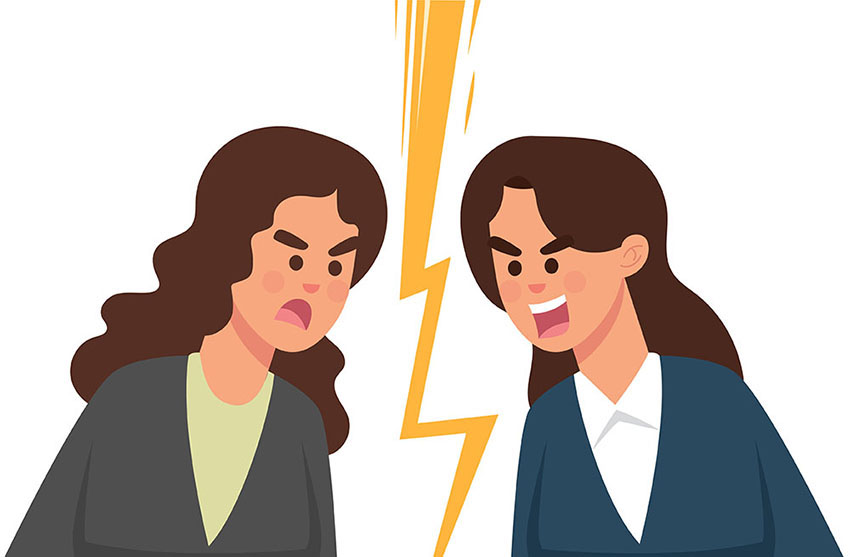
Women Are Mean to Each Other — Or So We Are Told
The initial research for our book It’s Not You, It’s the Workplace was focused on why women so often report they are dissatisfied with their same-gender workplace relationships. We began by digging into the raft of popular “self-help” books that argue that women have frequent workplace conflicts with other women because they are fundamentally antagonistic to one another. The books in this genre paint an ugly picture of women’s basic nature: Mean Girls at Work; Working with Bitches; Woman’s Inhumanity to Woman; The Stiletto in Your Back; Tripping the Prom Queen; Mean Girls Grown Up; and Mean Girls, Meaner Women.
We believe that the view of women’s workplace conflict is profoundly misguided. In It’s Not You, It’s the Workplace we make clear that, in fact, women are not intrinsically antagonistic toward one another but highly desirous of having strong, supportive same-gender relationships. Nevertheless, because this “women are mean to each other” trope is so common, we think it is important to understand just what is being claimed and why.
The books in this genre all take as a given that distinctive female personality characteristics prompt women to bully other women, spread malicious rumors about them, behave in two-faced ways toward them, seek to undermine their self-confidence, and secretly plot to destroy their professional standing. They also assert women’s dominant orientation in same-gender relationships is shaped by jealousy, envy, and competitiveness. Typical of the claims these books make are such statements as, “Women are the focus of gossip and suffer humiliation, betrayal, or social exclusion at the hands of other women with surprising frequency,” and “Conflict among women in the workplace is out of control and has become an area of intensified research and concern.”
No evidence women are inherently mean girls at work
We will explore these views more fully in a moment; but first, we want to make clear that we know of no evidence that women are motivated by distinctive female characteristics to be hostile to one another. Indeed, we believe it is profoundly misguided to assert that women’s difficulties in achieving satisfying same-gender workplace relationships are due to some unique aspect of the way women “are”—whether because of nature, nurture, or both. By assuming that there are fixed, identifiable psychological differences between women and men, these authors deflect attention from the substantial evidence that women and men are more alike than different.
Women and men do not have fixed feminine or masculine characteristics. It is not women’s and men’s natures that are critical for understanding their behavior but the nature of the situations in which they find themselves. External context, not internal characteristics, causes women and men to behave as they do at work. And external context is at the root of women’s same-gender workplace conflicts.
3 wrong reasons for women’s conflict at work
Nevertheless, many people still cling to the notion that women’s same-gender conflict at work is due to uniquely female predispositions and motivations. So, let’s look more closely at the three basic reasons commonly advanced in support of this view: evolution, socialization, and internalized misogyny.
Proponents of the evolutionary explanation argue that natural selection operates to ensure that the genes of only the fittest individuals are passed on to the next generation. As a result, evolutionary processes have shaped women to be inherently competitive with other women in the hunt for superior mates and the scarce resources needed to sustain their offspring. According to Cheryl Dellasega, author of Mean Girls Grow Up, this competitive instinct is carried over to the workplace and gets manifested in the “drive to care for and protect your ‘children,’ whether they are real, potential, or metaphorical (for example, clients, projects, employees, new business).”
Authors who argue that women’s antagonism toward other women is due to socialization claim that because women, unlike men, are strongly discouraged from openly expressing their negative feelings, such as anger and frustration, such feelings come out in unhealthy ways. Thus, according to Erica Holiday and Joan Rosenberg, authors of Mean Girls, Meaner Women, because women cannot openly direct their anger at the person or circumstance causing their distress, girls and women have a tendency “to turn on each other and hurt other girls or women.” This tendency is reinforced by women’s reluctance to take their anger out on men because they are likely to hold the social and organizational power.
Finally, other authors argue that women’s same-gender antagonism is the result of internalized misogyny. They claim that because women have grown up being treated as inferior to men, they come to believe that, in fact, they are inferior to men. And when women believe they are inferior, they also believe other women are inferior. As a result, the natural strategy for a woman in this position, according to Leora Tanenbaum, author of Catfight, is to belittle other women and to prove “her superiority among women— [to get] one step closer to the inner circle of men.”
What’s behind women’s workplace conflict
We go into the real reason for mean girls at work in our article on gender differences in the workplace. But for now, we want to reiterate that there is a fallacy underlying all of these arguments. The fallacy is that women and men are inherently different from each other in fundamental ways. Women’s and men’s behaviors depend not on distinctive female or male characteristics but on the situations in which they find themselves: what they are asked to do, the conditions under which they are required to do it, and the expectations of how they will perform while doing it. Women’s difficulties with other women in the workplace have little or nothing to do with women’s evolution, socialization, or internalized misogyny. They have everything to do with the dynamics of the environments within which women are working. In other words, it’s not the women, it’s their workplaces.

